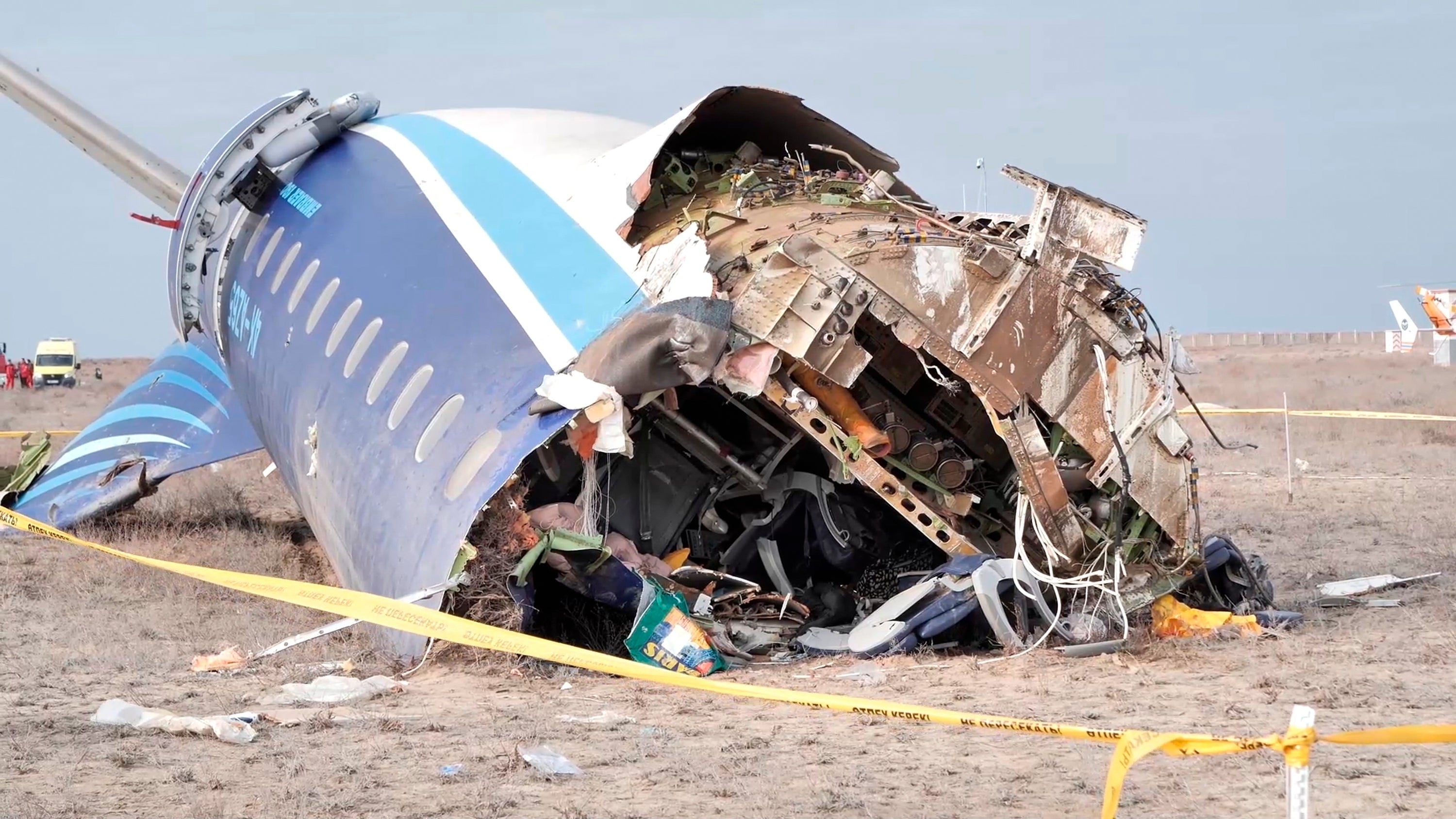Azerbaijan’s president said Russia shot down a passenger airliner, accusing Moscow of trying to cover up the issue for days.
Flight J2-8243 crashed on Wednesday in a ball of fire near the city of Aktau in Kazakhstan after diverting from southern Russia, where Ukrainian drones were reported to be attacking several cities. At least 38 people were killed in the crash while 29 survived.
Ilham Aliyev said the plane had been damaged due to “unintentional” shooting from the ground in Russia.
He said he regretted that “some circles” in Russia had tried to “hush up” the truth about the crash of the Azerbaijan Airlines plane by sowing false narratives about its causes.

Mr Aliyev told Azerbaijani state television: “We can say with complete clarity that the plane was shot down by Russia... We are not saying that it was done intentionally, but it was done.”
He said the airliner was hit by fire from the ground over Russia and was “rendered uncontrollable by electronic warfare”.
Mr Aliyev said he was “upset and surprised” by versions of events put forward by Russian officials.
“Unfortunately, for the first three days we heard nothing from Russia except delirious versions,” he said.
Captain Igor Kshnyakin and co-pilot Alexander Kalyaninov, both Russians with Azerbaijan citizenship, and Hokuma Aliyeva, a flight attendant, were given full honours at a ceremony at the Alley of Honour in central Baku attended by Mr Aliyev and his wife, Mehriban, on Sunday.
The pilots have been lauded in Azerbaijan for landing in a way which allowed 29 people to survive but led to their own deaths.
“Only through the courage and professionalism of the pilots was an emergency landing successfully carried out,” Azerbaijan’s presidential office said.
Captain Kshnyakin’s daughter, Anastasia, said: “My father always said: ‘When I take off, I am responsible not only for my life, but also for the lives of all passengers and crew members.’”
“With his last flight, he proved what a true hero should be.”
The Kremlin said air defence systems were firing near Grozny – the regional capital of the Russian republic of Chechnya – where the plane attempted to land, to deflect a Ukrainian drone strike.
Mr Aliyev said Azerbaijan has made three demands to Russia in connection with the crash.
He said: “First, the Russian side must apologise to Azerbaijan. Second, it must admit its guilt. Third, punish the guilty, bring them to criminal responsibility and pay compensation to the Azerbaijani state, the injured passengers and crew members.”
Mr Aliyev noted the first demand was “already fulfilled” when Russian president Vladimir Putin apologised to him on Saturday.

Mr Putin called the crash a “tragic incident” – though he stopped short of acknowledging Moscow’s responsibility. He said an investigation into the crash was ongoing, and that “the final version [of events] will be known after the black boxes are opened”.
Kremlin spokesperson Dmitry Peskov told Russian state media on Sunday that Mr Putin had spoken to Mr Aliyev over the phone again, but did not provide details of the conversation.
The Kremlin also said a joint investigation by Russia, Azerbaijan and Kazakhstan was underway at the crash site near Aktau.
The plane was flying from Azerbaijan’s capital, Baku, to Grozny when it turned toward Kazakhstan, hundreds of miles across the Caspian Sea from its intended destination, and crashed while making an attempt to land.
Passengers and crew who survived the crash told Azerbaijani media they heard loud noises on the aircraft as it was circling over Grozny.
Dmitry Yadrov, head of Russia’s civil aviation authority Rosaviatsia, said on Friday that as the plane was preparing to land in Grozny in deep fog, Ukrainian drones were targeting the city, prompting authorities to close the area to air traffic.
The crash is the second most deadly civil aviation accident linked to fighting in Ukraine. Malaysia Airlines Flight 17 was downed with a Russian surface-to-air missile, killing all 298 people aboard, as it flew over the area in eastern Ukraine controlled by Moscow-backed separatists in 2014.







